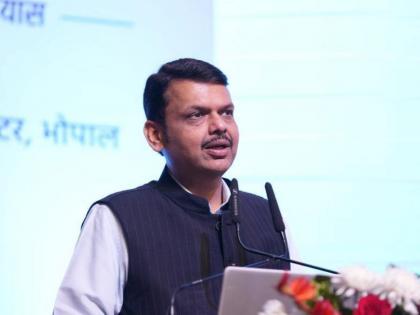Marathi Language Controversy: Can Students Choose Regional Languages Over Hindi? Here's What Devendra Fadnavis Says
By Lokmat English Desk | Updated: July 17, 2025 09:15 IST2025-07-17T09:14:47+5:302025-07-17T09:15:56+5:30
The implementation of the trilingual education policy from grade one in Maharashtra has triggered intense political debate. The policy ...

Marathi Language Controversy: Can Students Choose Regional Languages Over Hindi? Here's What Devendra Fadnavis Says
The implementation of the trilingual education policy from grade one in Maharashtra has triggered intense political debate. The policy faced major opposition due to the mandatory inclusion of Hindi. Raj Thackeray, chief of Maharashtra Navnirman Sena (MNS), strongly objected and called for a protest march with the slogan, “No flag, only Marathi agenda.” Uddhav Thackeray followed suit, voicing opposition to Hindi imposition. Various cultural groups, writers, and artists joined the dissent, forcing the government to temporarily withdraw the policy and form a review committee. However, the issue has resurfaced, reigniting political tensions across the state.
Chief Minister Devendra Fadnavis has now taken a firm stand, declaring that Maharashtra will definitely implement the trilingual formula. He criticized Uddhav Thackeray for reversing his stance, revealing that during the Maha Vikas Aghadi regime, a cabinet sub-committee including Shiv Sena’s representative had actually recommended making Hindi and English compulsory up to grade 12. Uddhav, as Chief Minister then, had accepted the recommendation and signed off on it in the cabinet. Later, he disowned the decision, claiming he hadn’t even read it, a stance Fadnavis mocked, calling it political hypocrisy.
Fadnavis explained that when the GR (Government Resolution) was first issued, it drew widespread questions over Hindi being made mandatory. Responding to public concern, the resolution was modified—Hindi was no longer compulsory. Students were given the choice to pick any Indian language as their third language, with the only condition being that at least 20 students opted for that language. “It’s not practical to hire a teacher for just two students who want to study Telugu,” said Fadnavis. The debate over introducing the third language from grade three also stemmed from research supporting age-appropriate language learning.
Referring to educational studies, Fadnavis emphasized that introducing multiple languages from grade three improves children's comprehension and cognitive development. He added that the central government's education policy was based on similar recommendations. Although the original committee report on the trilingual formula wasn’t from his tenure, the government revisited it after receiving varied opinions. A new committee has now been formed to finalize whether the implementation should begin from grade one or grade five. “It is not a matter of prestige, but I assure you: the trilingual policy will be implemented 100% in Maharashtra,” said Fadnavis.
Fadnavis also stated that glorifying English while rejecting Indian languages is unacceptable. “My biggest opposition is to those who lay out a red carpet for English but reject Indian languages. I will not tolerate that,” he said firmly.
Meanwhile, targeting Raj Thackeray, Fadnavis added, “I never pushed Raj out of his house. I had no role in that. But even those who troubled him enough to force him out should thank me—not just Raj.” He hinted that political shifts or compromises by Raj might be emerging due to current circumstances. “If I’ve helped that happen, then I welcome it,” Fadnavis concluded.
Open in app